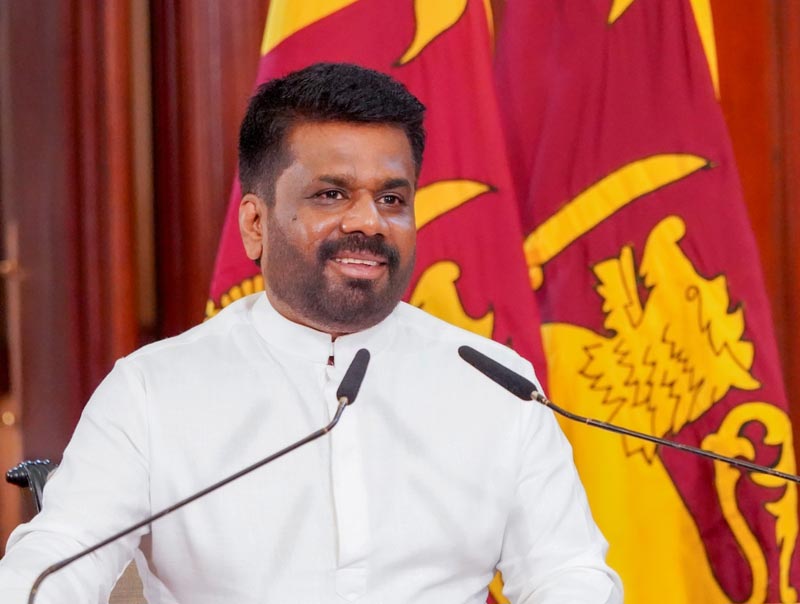Monday Feb 16, 2026
Monday Feb 16, 2026
Thursday, 26 September 2024 02:09 - - {{hitsCtrl.values.hits}}

President Anura Kumara Dissanayake addresses the nation last night
In his first address to the nation since assuming office, President Anura Kumara Dissanayake last night outlined his administration’s vision for a stable economy, national unity, and comprehensive reforms aimed at transforming Sri Lanka.
During the televised speech, Dissanayake emphasised the urgent need for economic stabilisation and trust-building, which he identified as the foundation for broader structural changes across sectors.
“We will begin discussions with the International Monetary Fund (IMF) soon and continue with the Extended Fund Facility,” said Dissanayake. He also pledged to accelerate Sri Lanka’s debt restructuring process by holding discussions with relevant creditors to secure debt relief. The President expressed confidence in garnering both public and international support to navigate the current economic challenges.
Before implementing long-term reforms, Dissanayake stressed the need for short-term economic stabilisation measures. “It is critical that we first stabilise the economy before executing mid and long-term plans,” he said, promising swift action to relieve immediate financial pressures on citizens.
Dissanayake also highlighted the importance of political and social change. He noted that his administration is committed to addressing the negative traits in Sri Lanka’s political culture. “One of the primary changes citizens expect is to eliminate the negative elements in our politics,” he said, pointing to the violence-free nature of the recent Presidential election as a positive step forward.
The President’s address underscored his desire to promote inclusivity, vowing to foster a sense of national unity across all ethnic and religious groups. “We must create a practical environment where everyone — Sinhalese, Tamil, Muslim, Burgher, or Malay — can proudly say, ‘We are Sri Lankan citizens,’” he declared. He committed to implementing necessary constitutional, economic, and political reforms to end divisive practices based on race, religion, or caste.
Dissanayake also emphasised the importance of a disciplined and law-abiding society. His administration, he said, is committed to maintaining public service integrity while building a nation that respects the rule of law. He expressed his determination to create a public service that is both efficient and honest, and focused on the people.
Addressing concerns about Sri Lanka’s future, the President spoke of plans to elevate the country’s global image and create a nation where citizenship is a source of pride for all. “Our goal is to build a country where the world respects our passport, and where every citizen can proudly say, ‘I am a Sri Lankan.’”
In a call for unity, Dissanayake invited all Sri Lankans to join in the effort to rebuild the country. He pledged to safeguard democratic rights and ensure that all citizens are treated with respect and equality under the law. “I understand that some may feel uncertain, but I am determined to earn your trust through my actions,” he said.
The President also reaffirmed his administration’s commitment to creating a secure future for the younger generation through education, skills development, and entrepreneurship. He also emphasised the importance of enhancing women’s representation in institutions and creating a strong social safety net for those with disabilities.
Dissanayake expressed his gratitude to the people of Sri Lanka for entrusting his movement with the responsibility of governance, stating: “The ownership of this victory belongs to the entire citizenry of this country.” He also took the opportunity to honour the sacrifices made by generations of Sri Lankans, particularly women, who contributed to the country’s progress and vowed to build a thriving, inclusive nation.